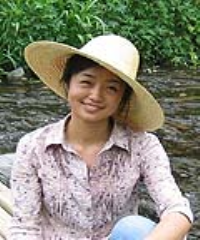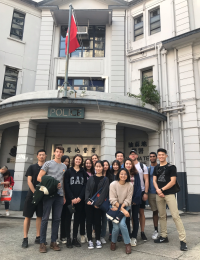Prof. Ling, what did you do before coming to Hong Kong and joining the Centre for China Studies?
I joined the Centre for China Studies at CUHK after completing my Ph.D. at Yale. I had been living and studying in the US for ten years. When I was looking for jobs upon graduation, this opportunity showed up and I saw it as the best option both career- and family-wise. My own academic meandering convinces me of the great advantages of an interdisciplinary approach to learning. Hence I treasure the agenda of the Centre for China Studies and feel fortunate to start my career here.
You just mentioned your academic meandering, can you share with us how you developed your academic interests from English Literature to International Relations, and then to Anthropology?
I kind of have a mixed academic background, and I consider myself an "accidental" anthropologist. I did not have a clear academic interest when I was an undergrad student. I chose English Literature because of my interest in literary work, and my desire to grasp a second language to explore the world. I got interested in journalism after two internships in news media in my senior year, and I saw studying abroad in a master's program in International Relations as a way to prepare myself to report on international affairs. Yet I gradually realized that my ultimate interest lay in China and the dazzling changes that have been shaping billions of lives - including my own. Still, I was unsure which discipline was the most suitable and exciting tool for me to approach and untangle all the complexities involving China. I took courses from various departments, and came across an anthropology class, which immediately drew me to its humanistic approach and ethnographic methods. Only then did I start applying for doctoral programs in anthropology to research and teach about China.
Most of your current research focuses on migrants in China, what are the pros and cons of conducting China-focused research in Hong Kong?
As mentioned, I chose this job partly because of its advantages for my research. It is very easy for me to go from Hong Kong to mainland China to do field research, as compared to flying all the way across the Pacific. And the CUHK Library has tremendous sources on both historic and contemporary China, better than most universities in the world. There is also a large group of China scholars working in and passing through Hong Kong, which is really helpful for developing a research network.
Any interesting or memorable experiences when doing your research and/or fieldwork?
There are lots, and it is hard to pick just one because I conducted my dissertation research for years. Most memorable moments always involve human interactions, during which I formed bonds with those who I studied. Yet as a researcher, especially as an anthropologist, I was trained to reflect constantly upon such relationships, as what we see and know is often shaped by how we interact with those we study. How is my observation and understanding shaped by such interactions, and how should I represent them in writing? So this intellectual exercise itself is very interesting, as it constantly asks me, "Who am I?" and "What does my work mean to them and to myself?" I like this kind of interactive process.
What do you find the most enjoyable and challenging in academic/teaching life?
Interacting with students from such diverse backgrounds and orchestrating classroom discussions has always been challenging yet exhilarating for me. Every year the class composition is different, as are students' responses. I have a very different experience in the same course every time, and that pushes me to revise the syllabus, teaching designs, and the ways I think and talk about the issues. Learning through teaching is real, and it makes this job less mechanical than most other jobs, right?
As the competition in the global job market gets more and more fierce, what advantages do you think CCS students have?
The university's top-class facilities and strategic location in Hong Kong – the most dynamic and multicultural metropolis that connects China and the outside world – make CUHK the ideal place to do Chinese studies. Its highly-mixed faculty team creates an interdisciplinary environment and tri-lingual learning experience for our students. I know a number of CCS students manage to speak both Cantonese and Mandarin, and improve their English significantly. I think this tri-lingual skill helps with job searching and career development. And for those who did not grow up in the Chinese context, CCS gives them a hands-on understanding of mainland China and Hong Kong. Such first-hand knowledge and cultural sensitivity can help CCS students claim niches and navigate paths in the global economy in which China plays a central role.
If you could give our students one piece of advice which would benefit them the most during their studies, what would it be?
As an academic advisor, I do feel the rising anxiety and insecurity you just mentioned among students today. Freshmen ask me about internships and job preparation right after arriving on campus. Clearly, job placement is on the minds of both students and their parents. I understand the reasons they are so anxious, as I am fully aware of the precarities resulting from the global neoliberal economy. Still, as their advisor, I always want to encourage them to be a bit more open-minded, and I hope they will take a long-term view about learning instead of treating university education as vocational training. Staying curious and open-minded is what I want to work on with the students, as I believe in the long term, especially after joining the job market, this is more important for them in order to have a meaningful and enjoyable life.
Thanks, and how about your advice to our post-grad students?
I think it is very important to stay open-minded, and be willing to read and engage with work from different fields, even though they may seem irrelevant at the moment. This is particularly important for Chinese Studies, which is interdisciplinary by definition. Branching outside of your sub-field to read widely about and beyond China helps you find sharp research questions and articulate research significance. Interdisciplinarity has been buzzed about for so long, but it is hard in practice, as it requires time and commitment, and patience. So, to our post-grad students, my advice would be to stay curious and be interdisciplinary.







-min.jpg)

-min.jpg)